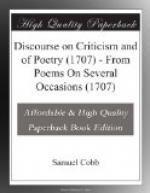I shall say no more at present on this Head, but proceed to give you an Account of the following Sheets. What I have attempted in them is mostly of the Pindaric and the Lyric Way. I have not follow’d the Strophe and Antistrophe; neither do I think it necessary; besides I had rather err with Mr. Cowley, who shew’d us the Way, than be flat and in the right with others.
Mr. Congreve, an ingenious Gentleman, has affirm’d, I think too hastily, that in each particular Ode the Stanza’s are alike, whereas the last Olympic has two Monostrophicks of different Measure, and Number of Lines.
The Pacquet-boat is just going off, I am afraid of missing Tide. You may expect the rest on the Pindaric Style. In the mean time I beg leave to subscribe myself,
Sir, Your ever Obedient and
Obliged Servant,
Samuel Cobb.
Of POETRY.
1. Its Antiquity. 2. Its Progress. 3. Its Improvement.
A POEM.
Antiquity of Poetry
Sure when the Maker in his
Heav’nly Breast
Design’d a Creature to command the
rest,
Of all th’ Erected Progeny of
Clay
His Noblest Labour was his First Essay.
There shone th’ Eternal Brightness,
and a Mind
Proportion’d for the Father of Mankind.
The Vigor of Omnipotence was seen
In his high Actions, and Imperial Mien.
Inrich’d with Arts, unstudy’d
and untaught,
With loftiness of Soul, and dignity of
Thought
To Rule the World, and what he Rul’d
to Sing,
And be at once the Poet and the King.
Whether his Knowledge with his breath
he drew,
And saw the Depth of Nature at a View;
Or, new descending from th’ Angelick
race,
Retain’d some tincture of his Native
Place.
Fine was the Matter of the
curious Frame,
Which lodg’d his Fiery Guest[1],
and like the same
Nor was a less Resemblance in his Sense,
His Thoughts were lofty, just his Eloquence.
Whene’re He spoke, from his Seraphick
Tongue
Ten Thousand comely Graces, ever young,
With new Calliopes and Clio’s
sprung.
No shackling Rhyme chain’d the free
Poet’s mind,
Majestick was His Style, and unconfin’d.
Vast was each Sentence, and each wondrous
strain
Sprung forth, unlabour’d, from His
fruitful Brain.




